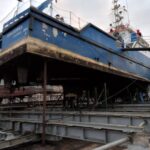Sri Lankan Navy Dockyard has a story to tell. A gigantic 850-acre naval establishment, it has seen many sunny days, and weathered many gloomy ones, since the British Colonial Era. From tales of yore combating many enemy ships and the heroism of the Sri Lankan Navy comrades who sacrificed their lives at sea to liberate their land from foes, Navy Dockyard is a kaleidoscope of colourful experiences, joy, love, grief, and sorrow.
It is nearly 11 years since the civil war and the Navy Dockyard has been taking a worthy respite from battling enemy fleets. However, true to form, the Navy officers patrolling the area stayed vigilant, thus facilitated a unique rescue operation by the Sri Lankan Naval diving unit
Oceanlust reached out to Commodore Anura Danapala, a naval officer, stationed at Navy Dockyard, Trincomalee, who shed light on this delightful and heart-warming rescue operation. It is important to note that Commodore Dhanapala is a passionate nature lover, and has not only contributed to the story that is about to unfold but has also rescued many sea turtles. The Sri Lankan Naval Diving Unit had been conducting their patrol at sea when they spotted a deer at the beach. The deer had been severely distressed and was being chased by a dog.
“The Navy Dockyard is a large establishment, and part of it is the jungle. Sadly the dogs in the region have become wild, – probably due to lack of food- and tend to chase after deer, and attack them. This case was no different, the dog was trying to attack the deer, and it had no place to go. So the deer was fleeing to the beach instead. However, the dog was also relentless,” he said.
The poor creature (who in fact, turned out to be a doe, a female deer), desperate and helpless, could not outrun the dog, so she jumped into the sea. “It was struggling in the water,” he continued, “however the waves and the currents were quite strong and the doe was being swallowed by it. Deer are not good swimmers. The divers had been watching what was taking place, they came speeding towards the doe and with the greatest difficulty, they managed to hoist it out of the water and place it in the boat. This was quite a hard feat to achieve as it was a rather large animal. They brought the doe to the diving unit.”
Initial medical examination revealed that the deer had sustained two bites from the dog attack. Upon advice from the veterinary surgeon, the deer was not released into the jungle till it healed from its wounds.
“The deer is a very sensitive animal. Even if you shout at the creature, they tend to panic. This doe was no different. So it was stationed in the diving unit, and we got some medicines prescribed by the veterinary surgeon,” he said.
While the doe was recuperating in the diving unit, the naval dockyard was made privy to the most delightful of experiences. Just within 24 hours of the rescued doe recuperating in the diving unit, she had delivered a baby fawn. The rescuers were unaware that the doe was pregnant, and only identified her as a large animal with a large stomach. Explaining further he said, “We assumed that her inflated stomach was due to water retention from the sea. The little fawn was named Scuba by the divers.” The name in itself brings delight and pays tribute to the divers who conducted this humanitarian operation. Scuba is an underwater breathing apparatus, which is used by divers in their underwater expedition. The baby fawn miraculously survived in its distressed mother’s womb, escaped a major dog attack, and nearly drowned in the ocean before being rescued.
Divers temporarily provided foster care to the doe and scuba. They arranged a room for them and facilitated the duo to heal completely. According to Commodore Dhanapala, the doe and her young was allowed to gradually acclimatise themselves to the jungle. The pair had been roaming around the dockyard in close proximity to the adjacent jungle for about six weeks.
“However, one fine day, they noticed a herd of deer emerge from the jungle, and then they also joined them. They are certainly in the vicinity, although I cannot differentiate Scuba and his mother from the rest of the herd, I am sure they are in the area,” the nostalgia and hope was apparent in Commodore Dhanapala’s voice.
Animals, unlike humans, tend to be grateful creatures, and tend to seek out their helpers and rescuers to show their appreciation. Will Scuba and his mother make such a visit to the Dockyard?
“We have been coexisting with such animals for generations. They are alright as they are. The threat of wild dogs is still very present. However, within their safety zone, they roam around closer to the dockyard and that is indicative as to how comfortable and safe they feel,” he said.
Even though they may not want to risk another dog attack, it is absolutely certain that Scuba and his mother are grateful to their kind-hearted and brave navel rescuers. No doubt, the duo will certainly regale their herd with tales of their adventure at the Sri Lankan Navy Dockyard.






Leave a Reply